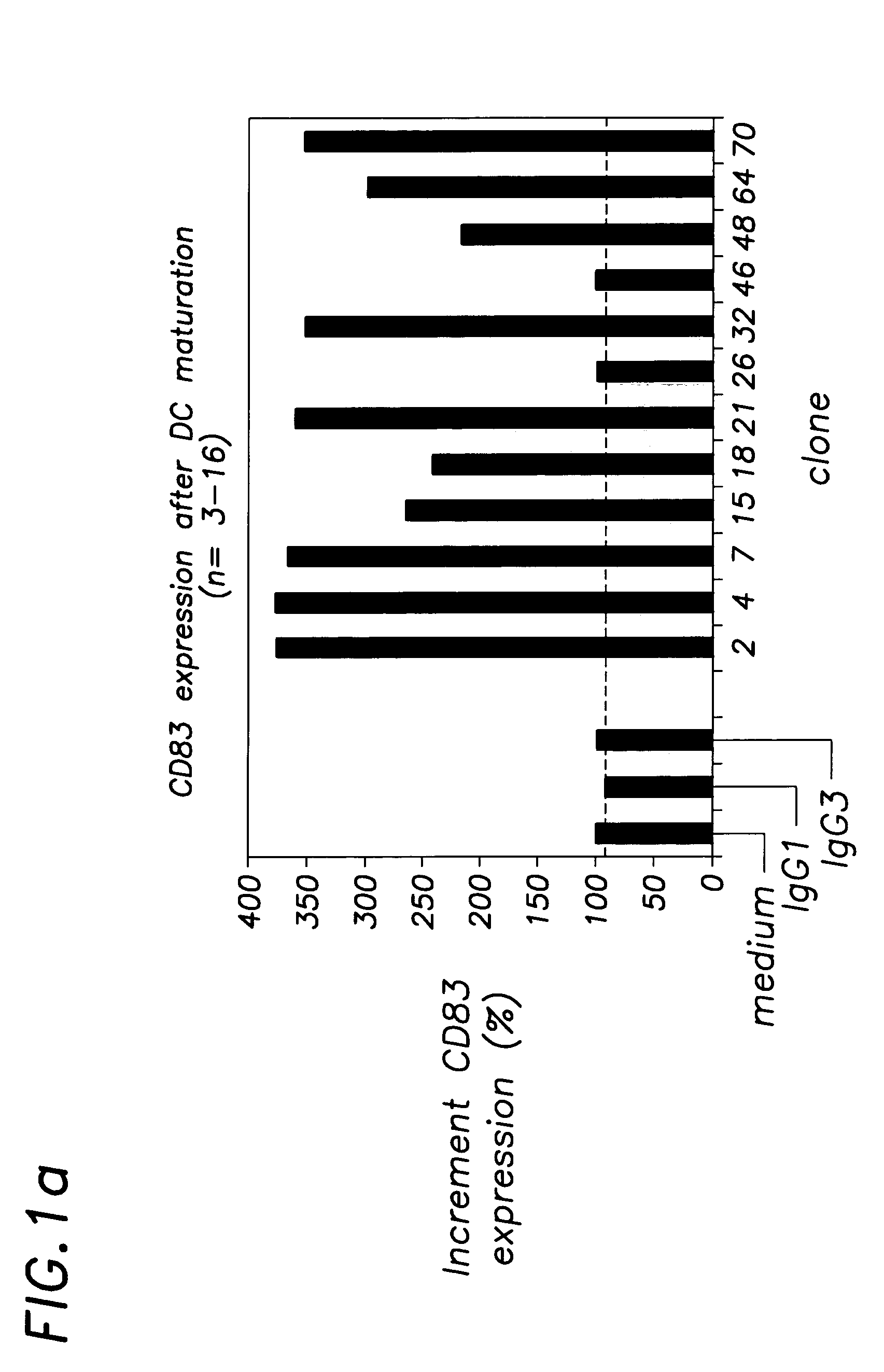Induction of cytotoxic T lymphocyte responses using anti-CD40 antibodies
a technology of cytotoxic t lymphocytes and anti-cd40, which is applied in the field of induction of cytotoxic t lymphocyte responses using anti-cd40 antibodies, can solve problems such as synergistic or additive agonistic effects
- Summary
- Abstract
- Description
- Claims
- Application Information
AI Technical Summary
Benefits of technology
Problems solved by technology
Method used
Image
Examples
example 1
Generation of Mouse Anti-Human CD40 Monoclonal Antibodies
[0047]Two immunization protocols were used to generate anti-CD40 monoclonal antibodies. In the first, female BALB / c mice were injected intraperitoneally with SF-9 cells expressing CD40 (3×106 cells / mouse), which were washed with PBS twice before injection. At day 17 and 31 the mice received a booster injection with SF-9 cells. Fourteen days after the last the last the injection the spleen cells were isolated and 108 cells were used for cell fusion with 108 SP2 / 0 murine myeloma cells using polyethylene glycol. The fused cells were resuspended in D15 (a modified DMEM medium) supplemented with HAT, followed by plating on fifty-one 96 wells plates. After 10–14 days supernatants of wells containing growing hybridoma cells were screened for anti-CD40 antibody production in an ELISA. This analysis showed that a total of 69 wells out of 4896 seeded wells contained hybridomas producing anti-human CD40 specific antibodies. Culture super...
example 2
Screening the CD40 Binding Antibody Samples from Hybridoma Lines for Agonistic Activity on THP-1 Cells and Subsequent Cloning of Lines and Testing of Monoclonal Mabs
[0049]To screen for antibodies with agonistic activity, the selected supernatants containing CD40 binding antibodies were subsequently tested for their ability to induce IL-8 production in the CD40 expressing monocytic cell line THP-1, which had been pre-incubated with IFN-γ. Most supernatants contained anti-CD40 antibodies, which displayed agonistic activity in this assay. Supernatants were arbitrarily subdivided into four different groups on the basis of their performance in the THP-1 assay (strong agonists with an OD of >2.000, intermediate agonists with an OD between 1.000–2.000, low agonists with an OD between 0.375–0.999 and non-agonists with an OD <0.375).
[0050]A number of the hybridoma lines were cloned and monoclonal antibodies from the resulting clones were also tested in the THP-1 assay. Most but not all clone...
example 3
Assaying the Ability of the CD40 Reactive Antibody Clones to Drive Maturation, IL-12p70 Production and Priming for CTL Activation of Immature DC
[0051]DC derived from monocytes after culture with GM-CSF and IL-4 represent immature DC. Anti-CD40 monoclonal antibodies have been assayed for their capacity to induce maturation of these CD40 expressing immature DC. Experiments from other investigators have shown that stimulation of monocyte-derived DC with sCD40L results in their differentiation into DC with a mature phenotype. Furthermore, sCD40L in combination with IFN-γ stimulates monocyte-derived DC to secrete IL-12p70. In contrast to immature DC, mature DC express CD83. In addition, compared to immature DC, mature DC display enhanced expression on a per cell basis of the co-stimulatory molecules CD80 and CD86, decreased expression of the mannose receptor and loss of the ability to efficiently take up molecules, as shown for dextran-FITC. At first the phenotypical changes that accompa...
PUM
| Property | Measurement | Unit |
|---|---|---|
| Cytotoxicity | aaaaa | aaaaa |
Abstract
Description
Claims
Application Information
 Login to View More
Login to View More - R&D Engineer
- R&D Manager
- IP Professional
- Industry Leading Data Capabilities
- Powerful AI technology
- Patent DNA Extraction
Browse by: Latest US Patents, China's latest patents, Technical Efficacy Thesaurus, Application Domain, Technology Topic, Popular Technical Reports.
© 2024 PatSnap. All rights reserved.Legal|Privacy policy|Modern Slavery Act Transparency Statement|Sitemap|About US| Contact US: help@patsnap.com










